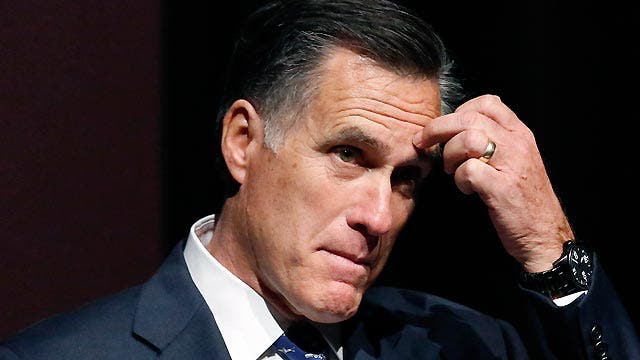Mitt Romney provides first big surprise of the 2016 campaign
Chief political correspondent Carl Cameron reports
Mitt Romney announced Friday he will not run for president in 2016, after briefly flirting with a third White House run -- a decision that only slightly narrows the crowded field of potential Republican candidates.
"After putting considerable thought into making another run for president, I've decided it's best to give other leaders in the party the opportunity to become our next nominee," Romney told donors on a conference call Friday morning.
The announcement comes after the 2012 GOP nominee, who repeatedly denied interest in another campaign, surprised donors earlier this month by telling them he was considering it.
Since then, the former Massachusetts governor spent three weeks calling donors and strategists and giving a handful of addresses, including to a Republican National Committee summit. But while some from his former campaign team were willing to wait for his decision, others were already gravitating toward the budding campaign of former Florida Gov. Jeb Bush.
The two heavyweights were seen as competing for many of the same donors, supporters and strategists. And some doubted whether Romney, who lost to President Obama in 2012 after a campaign in which Democrats cast him as out-of-touch, would be able to connect on a third run -- even as early polls showed him leading the GOP field.
Romney, in a written statement which he also read from on his conference call, said he believes that he could win the nomination, and that he would have enough funding and support.
"The reaction of Republican voters across the country was both surprising and heartening," he said in the statement. At the same time, Romney said it would have been a "difficult test and a hard fight," and it's time for a new voice.
"I believe that one of our next generation of Republican leaders, one who may not be as well known as I am today, one who has not yet taken their message across the country, one who is just getting started, may well emerge as being better able to defeat the Democrat nominee," Romney said. "In fact, I expect and hope that to be the case."
He said he will not hire a campaign team, will not take donations and will not organize a political action committee.
Romney recently spoke with Bush in a private meeting in Utah. It's unclear whether that meeting set the stage for Friday's announcement.
Bush, in a written statement on Friday, praised Romney as a party leader and a patriot. "There are few people who have worked harder to elect Republicans across the country than he has," he said. "Though I'm sure today's decision was not easy, I know that Mitt Romney will never stop advocating for renewing America's promise through upward mobility, encouraging free enterprise and strengthening our national defense."
A day earlier, it emerged that a key former Romney adviser was joining up with Bush's team.
Bush recruited Romney's former senior Iowa adviser, David Kochel, as a senior strategist for his newly launched Right to Rise PAC. If Bush formally pursues a White House bid, Kochel could take on a bigger role.
Former Romney donors also told The Associated Press they were moving toward Bush. The donors, in interviews with The Associated Press, said they see in Bush what they liked about Romney in 2012, the capacity to serve successfully as president, but also something Romney could not muster over two campaigns: the personality and senior staff needed to win the White House.
Bush was hardly the only impediment to a Romney run. A slew of other high-profile Republicans are considering a campaign including New Jersey Gov. Chris Christie, Florida Sen. Marco Rubio, Kentucky Sen. Rand Paul and Wisconsin Gov. Scott Walker.
Larry Sabato, director of the University of Virginia Center for Politics, said Romney just wasn't the "giant" of the field that he was in 2012. "You've got a herd of people running for the Republican nomination for president," he told Fox News.
For a brief spell, though, Romney was back in his role as chief target of national Democrats, some of whom relished the potential chance to hammer him in 2016.
Speaking to Democrats in Philadelphia on Thursday, President Obama said, "We've got a former presidential candidate on the other side who suddenly is just deeply concerned about poverty. That's great. Let's go. Come on."
He added: "Let's do something about it. I am glad that their rhetoric at least has shifted. But let's now make sure that the policies match up with the rhetoric."
Romney responded on Twitter. "Mr. Obama, wonder why my concern about poverty? The record number of poor in your term, and your record of failure to remedy," he wrote.
Fox News' Serafin Gomez and The Associated Press contributed to this report.













































